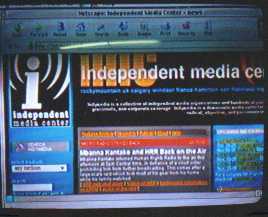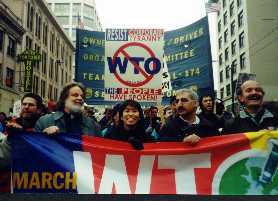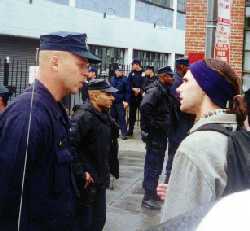|
Back to On the Road with John Tarleton
Back to Democratizing the Media: Voices of the Indy Media Convergence
The IMC Fills a Niche: Protesters Develop Their Own Global Internet News Service
By John Tarleton I was soaking wet and sitting near the back of a bright yellow school bus when another round of spirited singing broke out. Though I was not wearing my IMC press badge (nor any other ID), I had been filing daily stories for the Independent Media Center (IMC) - a Web publication in which coverage of news events emphasized issues and included voices not featured in mainstream reporting -- during the week leading up to the April protests against the World Bank and International Monetary Fund in Washington, D.C.
He was on his way to jail. And so were the rest of us.
Launching a Peoples' Newsroom
With $30,000 in donations (including a hefty amount from an ex-Microsoft employee) and lots of borrowed equipment, the Seattle IMC was able to occupy a small storefront office in downtown Seattle. Our news might not be televised, but now it was ready to be downloaded.
Back on the BeatAnother IMC Web site opened up in early April. Based out of Washington, D.C., it was created to cover the A16 Mobilization for Global Justice. A16, which targeted the IMF and the World Bank, was the sequel to Seattle. Our work area was in a small art gallery in northwest Washington. Striking Pacifica Radio stringers and other seasoned journalists such as Eric Galatas, (Program Director of Free Speech TV), Michael Eisenmenger (of Paper Tiger TV) and Eddy Becker (formerly of the National Security Archive) worked side-by-side all week with those who had little or no experience.
It has been a long time since young people have filled this country's jails in the name of justice. There were 1,353 arrests in Washington. The best way to cover the story, I felt, was to be right in the middle of it. I was in custody for 24 hours before I unexpectedly found myself released at arraignment with all charges dismissed. However, 155 of the protesters stayed in jail another four days-singing, hunger striking, refusing to give their names, stripping off their clothes en masse and going limp or tying themselves to their cots-until they were able to collectively bargain the terms of their release. It was a helluva story. And I ended up telling it ("Adora's Story: 19-Year-Old Protester Arrested for First Time at IMF Demonstrations; Does 5 Days in Jail") through the eyes of a talkative young woman who was in for the full ride. The insights I gained while in custody were invaluable.
An Expanding Network
As a product of the anti-corporate globalization movement, the IMC shares both its strengths and weaknesses. It is defiant, angry, hopeful, chaotic, creative, generous and, at times, painfully naïve. It is a voluntocracy that operates mostly on youthful enthusiasm. And in true anarchist fashion, it is decentralized and highly participatory. All decisions are made by consensus. The heart of each IMC site is the newswire that runs down the right-hand side of the screen. The best stories are culled from the newswire by editorial collectives and placed in the center column of the page. Links to other IMC sites appear in the left-hand column. Since anyone can upload a story onto the newswire, what arrives makes for an interesting brew. Here is a sampling of headlines from stories that appeared on the main newswire one day in late October:
* "Breaking News! Major Coal Sludge Spill Threatens Kentucky" Is this a bulletin board for the far left, or a robust annex to the marketplace of ideas? Some will question whether IMC Journalism is real journalism since it is not "objective", in the traditional sense. Do we have the objective distance to question our own assumptions? Time will tell. Yet, we would argue that many corporate journalists have their own deeply ingrained bias toward retaining the status quo. Relying heavily on official sources within government and business, corporate journalism sets the narrow parameters that actually are put forth for public debate. Every notion that falls outside of those parameters, such as the possibility of having universal health care as every other Western industrial democracy does or the risks of genetic engineering or the buildup of a prison industrial complex or the deepening misery of the Palestinians, just to cite a few examples, is generally either derided or ignored by the mainstream press. It also appears that corporate journalists rise through the ranks not only because of their cleverness and their work ethic but also because of their uncanny ability to always ask the wrong questions. To what extent this is done consciously (self-censorship) or unconsciously (internalization of institutional values) is impossible to say and it really does not matter. The result is the same: journalism as the monologue of power. I believe journalism is not about applauding the powerful but challenging how power is used and abused. It's about asking hard-hitting questions that shed light in dark places. It's about communicating information that not only gets the who, what, where and when correct but tries to put stories in a fuller context, often by asking and trying to answer the "why" questions, as well. And it is about seeking out the stories of those who live on the margins and lack power within the system, which includes most people in one way or another. If this is how journalism was practiced, it would be the beginning of an American "glasnost." The IMC is still a long way from fulfilling this ideal. But, at least the will to do so is there. Note: John Tarleton has participated at IMC's in Seattle, Washington, D.C., Philadelphia, Boston and New York. This article appears in the Winter 2000 issue of Nieman Reports Back to On the Road with John Tarleton
|
 Now I couldn't reach the ballpoint pen and soggy notepad that were tucked in my inside jacket pocket. So I tried to memorize the scene around me-how it felt, what people were saying and doing, the uncertainty about what lay ahead. As the singing subsided, a discussion broke out about Monsanto's genetically engineered foods and the privatization of the world's water supplies. Police looked on indulgently as a scruffy young man calling himself "Dionysius Gonorrhea" periodically filled the bus with his indignant rage. "24,000 children in this world are going to die of hunger today!" he'd yell. "24,000 children in this world are going to die of hunger tomorrow! 24,000 children in this world are going to die of hunger on Wednesday…"
Now I couldn't reach the ballpoint pen and soggy notepad that were tucked in my inside jacket pocket. So I tried to memorize the scene around me-how it felt, what people were saying and doing, the uncertainty about what lay ahead. As the singing subsided, a discussion broke out about Monsanto's genetically engineered foods and the privatization of the world's water supplies. Police looked on indulgently as a scruffy young man calling himself "Dionysius Gonorrhea" periodically filled the bus with his indignant rage. "24,000 children in this world are going to die of hunger today!" he'd yell. "24,000 children in this world are going to die of hunger tomorrow! 24,000 children in this world are going to die of hunger on Wednesday…"
 The
The  The IMC was an end-run around the information gatekeepers, made possible by the technology of the Internet. The IMC Web site uses open source software that allows people to instantly upload stories and clips onto the site. And the news that was uploaded was evidently what a lot of people wanted to read. During its coverage of the weeklong
The IMC was an end-run around the information gatekeepers, made possible by the technology of the Internet. The IMC Web site uses open source software that allows people to instantly upload stories and clips onto the site. And the news that was uploaded was evidently what a lot of people wanted to read. During its coverage of the weeklong  It was my first time working in a newsroom since I'd left my job as a news reporter at the Ottumwa (IA) Courier a decade earlier. I ran all over town doing stories on "puppetistas" and Lesbian Avengers and high school kids who were banned from putting up A16 posters because school authorities thought "schools are a place for education not politics". I followed a squad of Pennsylvania Teamsters through the halls of Congress as they lobbied against the China Free Trade Bill. I was standing in front of the protesters' headquarters when more than 100 police raided it
and shut it down for alleged fire code violations. Later, I ended up on the bus with Dionysius Gonorrhea.
It was my first time working in a newsroom since I'd left my job as a news reporter at the Ottumwa (IA) Courier a decade earlier. I ran all over town doing stories on "puppetistas" and Lesbian Avengers and high school kids who were banned from putting up A16 posters because school authorities thought "schools are a place for education not politics". I followed a squad of Pennsylvania Teamsters through the halls of Congress as they lobbied against the China Free Trade Bill. I was standing in front of the protesters' headquarters when more than 100 police raided it
and shut it down for alleged fire code violations. Later, I ended up on the bus with Dionysius Gonorrhea.
 The IMC continues growing as it both covers and helps to create the movement against corporate globalization. It is now, in the lingo of our times, "a diversified global media group". It has thousands of workers/participants, a catchy logo and 37 sites scattered in cities across the US and Canada and in countries including Mexico, France, Italy, Israel and India. Dozens more are in the queue. At this fall's IMF/World Bank demonstrations, 500 people from 32 countries participated in the Prague IMC. And, discussions are well underway about everything from whether to adopt 501C3 non-profit status to how to best set up a global IMC "spokescouncil" with each local IMC represented by an empowered spoke.
The IMC continues growing as it both covers and helps to create the movement against corporate globalization. It is now, in the lingo of our times, "a diversified global media group". It has thousands of workers/participants, a catchy logo and 37 sites scattered in cities across the US and Canada and in countries including Mexico, France, Italy, Israel and India. Dozens more are in the queue. At this fall's IMF/World Bank demonstrations, 500 people from 32 countries participated in the Prague IMC. And, discussions are well underway about everything from whether to adopt 501C3 non-profit status to how to best set up a global IMC "spokescouncil" with each local IMC represented by an empowered spoke.